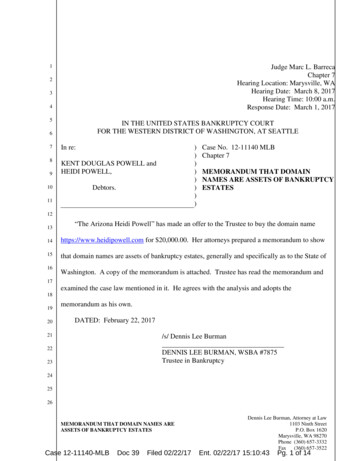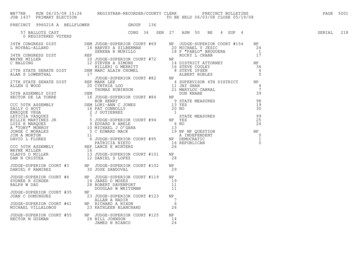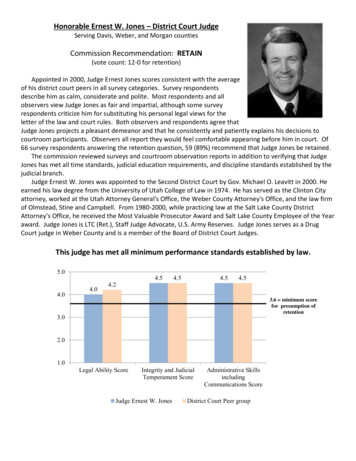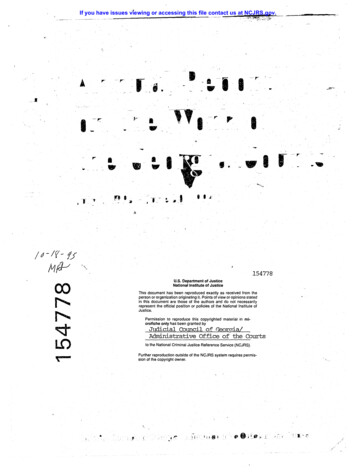
Transcription
1Judge Marc L. BarrecaChapter 7Hearing Location: Marysville, WAHearing Date: March 8, 2017Hearing Time: 10:00 a.m.Response Date: March 1, 20172345IN THE UNITED STATES BANKRUPTCY COURTFOR THE WESTERN DISTRICT OF WASHINGTON, AT SEATTLE67In re:8KENT DOUGLAS POWELL andHEIDI POWELL,910))))))))Debtors.11Case No. 12-11140 MLBChapter 7MEMORANDUM THAT DOMAINNAMES ARE ASSETS OF BANKRUPTCYESTATES1213“The Arizona Heidi Powell” has made an offer to the Trustee to buy the domain name14https://www.heidipowell.com for 20,000.00. Her attorneys prepared a memorandum to show15that domain names are assets of bankruptcy estates, generally and specifically as to the State of16Washington. A copy of the memorandum is attached. Trustee has read the memorandum and17examined the case law mentioned in it. He agrees with the analysis and adopts the181920memorandum as his own.DATED: February 22, 201721/s/ Dennis Lee BurmanDENNIS LEE BURMAN, WSBA #7875Trustee in Bankruptcy2223242526MEMORANDUM THAT DOMAIN NAMES AREASSETS OF BANKRUPTCY ESTATESCase 12-11140-MLBDoc 39Filed 02/22/17Dennis Lee Burman, Attorney at Law1103 Ninth StreetP.O. Box 1620Marysville, WA 98270Phone (360) 657-3332Fax (360) 657-3522Ent. 02/22/17 15:10:43Pg. 1 of 14
MEMORANDUMTO: Dennis BermanFROM: Jaburg & Wilk, P.C.DATE: February 21, 2017RE: Domain name as asset of bankruptcy estate in State of WashingtonAs discussed, below is the research you requested regarding whether domainnames are assets of the bankruptcy estate in the State of Washington.I.A DOMAIN NAME IS PROPERTY OF THE BANKRUPTCY ESTATEAND MAY PROPERLY BE SOLD FOR THE BENEFIT OF CREDITORS.With few exceptions, property of the estate consists of “all legal or equitableinterests of the debtor in property as of the commencement of the case.” 11 U.S.C.§ 541(a)(1) (emphasis provided). The concept of “property of the estate” is interpretedbroadly. See, e.g., United States v. Whiting Pools, Inc., 462 U.S. 198, 204–05, 103 S. Ct.2309, 2313, 76 L. Ed. 2d 515 (1983) (“The House and Senate Reports on the BankruptcyCode indicate that § 541(a)(1)’s scope is broad.”); In re Mila, Inc., 423 B.R. 537, 542(B.A.P. 9th Cir. 2010) (“Property of the estate is to be construed broadly.”); In re Porrett,547 B.R. 362, 366 (Bankr. D. Idaho 2016) (“The scope of the bankruptcy estate isextremely broad, including both tangible and intangible property.”); In re Palmer, 167B.R. 579, 585 (Bankr. D. Ariz. 1994) (“The intent of this provision is to include allproperty rights of the Debtor, even if the property right is contingent.”); In re Linderman,20 B.R. 826, 827–28 (Bankr. W.D. Wash. 1982) (“The legislative history indicates thatthe scope of Section 541 was intended to be extremely broad.”) (internal citationsomitted). The specifically enumerated exceptions to this broadly inclusive language“indicate[ ] that other exceptions should not be implied.” In re Gerwer, 898 F.2d 730,732 (9th Cir. 1990); see also Matter of Cont'l Airlines, Inc., 134 B.R. 536, 541 (Bankr. D.18796-18796-00001\AKH\AKH\2412535.3Case 12-11140-MLBDoc 39Filed 02/22/17Ent. 02/22/17 15:10:43Pg. 2 of 14
Del. 1991) (“The property is included unless it meets one of the narrow statutoryexceptions.”).A.Federal law recognizes a domain name is property.In 1999, Congress passed the Anticybersquatting Consumer Protection Act(“ACPA”) as an amendment to the Lanham Trademark Act. 15 U.S.C. § 1125(d). Underthe ACPA, a trademark owner is authorized to proceed in personam against an alleged“cybersquatter”—a domain name registrant who has attempted to capitalize on thetrademark of another by using the mark in a domain name URL. Id. § 1125(d)(1). Whenthe trademark owner is unable to locate the cybersquatter, the owner is authorized toproceed in rem against the infringing domain name. Id. § 1125(d)(2)(A). In such anaction, the situs of the domain name is deemed located in the judicial district where theregistrar or registry is located, or where “documents sufficient to establish control andauthority regarding the disposition of the registration and use of the domain name aredeposited with the court.” Id. § 1125(d)(2)(C)(i)–(ii).The ACPA provision for in rem jurisdiction implicitly recognizes that a domainname constitutes property. In fact, the Ninth Circuit has cited the ACPA—as persuasiveauthority—in support of its conclusion that domain names are intangible property, subjectto writs of execution under California law. See Office Depot Inc. v. Zuccarini, 596 F.3d696, 703 (9th Cir. 2010).B.A domain name is property under Washington law“In the absence of any controlling federal law, ‘property’ and ‘interest[s] inproperty’ are creatures of state law.” Barnhill v. Johnson, 503 U.S. 393, 112 S. Ct. 1386,1387 (1992); see also In re Bright, 241 B.R. 664, 666 (B.A.P. 9th Cir. 1999) (“Absent afederal provision to the contrary, a debtor’s interest in property is determined byapplicable state law.”); In re Pittman, 540 B.R. 451, 455 (Bankr. W.D. Wash. 2015)(“Courts look to state law to determine property rights unless federal law requires a18796-18796-00001\AKH\AKH\2412535.3Case 12-11140-MLBDoc 392Filed 02/22/17Ent. 02/22/17 15:10:43Pg. 3 of 14
contrary result.”). Although courts in the State of Washington have not definitivelyaddressed the issue of whether domain names constitute property, Washington lawsuggests the courts would consider domain names property. Notably, no Washingtoncourts have indicated domain names are not property.1.The Washington Court of Appeals appears to have accepted thetrial court’s treatment of a domain name as property.In Bero v. Name Intelligence, Inc., the Washington Court of Appeals consideredan appeal from a trial court order terminating a receivership. 195 Wash. App. 170, 172–73, 381 P.3d 71, 72–73 (2016), review denied sub nom. Westerdal v. Name Intelligence,Inc., 187 Wash. 2d 1002, 386 P.3d 1085 (2017). After the owner of Name Intelligence,Inc. (a company that bought and sold domain names) failed to pay a substantial judgment,the creditor successfully requested that the trial court place the owner’s companies andother property into receivership. Id. at 173, 381 P.3d 71, 73.The trial court’s order, appointing the receiver, authorized the receiver to collectcommission on the sale of receivership property, including 1% of the gross sale price ofthe domain name www.holiday.com . See Bero v. Name Intelligence, Inc., No. 13-225989-3 SEA, 2014 WL 7190099 *7 (Wash. Super. Ct., King Cty. Aug. 1, 2014). Thisindicates the trial court understood the domain name to be property subject to executionby a receiver. It does not appear any party challenged the court’s treatment of the domainname as property, either in the trial court or on appeal. Thus, the court of appeals did notexpressly address the issue. However, the court of appeals did not question the trialcourt’s treatment of the domain name as property, and it proceeded—like the trial court—as if the fact was understood and accepted. See generally 195 Wash. App. 170, 381 P.3d71. Thus, in at least one instance, Washington courts have treated domain names asproperty.18796-18796-00001\AKH\AKH\2412535.3Case 12-11140-MLBDoc 393Filed 02/22/17Ent. 02/22/17 15:10:43Pg. 4 of 14
2.Federal courts in the Western District of Washington havetreated domain names as general intangibles—as additionalforms of intellectual property.In two related district court lawsuits, both Judges Jones and Judge Zilly referred rations,anddomainnameregistrations, collectively, as the “Intellectual Property” at issue. 3BA Properties LLC v.Claunch, No. C13–979 TSZ, 2013 WL 6000065 *1 (W.D. Wash. Nov. 12, 2013); 3BAInt’l LLC v. Lubahn, C10-829RAJ, 2012 WL 2317563, at *1 (W.D. Wash. June 18,2012). Both cases concerned a bankruptcy debtor that failed to schedule his interest in theIntellectual Property. See, generally, id. After receiving a discharge, the debtor’sbankruptcy was reopened and the copyrights, trademarks, and domain names were soldby the bankruptcy trustee. Claunch, 2013 WL 6000065 at *1; Lubahn, 2012 WL 2317563at *2. The subsequent lawsuits in district court concerned, inter alia, the debtor’s effortsto interfere with the purchaser’s use of the “Intellectual Property,” Lubahn, 2012 WL2317563 at *3, and a legal malpractice suit brought by the debtor, Claunch, 2013 WL6000065 at *2. In both cases, the federal judges recognized the bankruptcy court’s sale ofthe Intellectual Property—including the domain names—out of the bankruptcy estate.Claunch, 2013 WL 6000065 at *1; Lubahn, 2012 WL 2317563 at *6.Ruling on cross-motions for summary judgment in Lubahn, Judge Jones stated“[t]he court agrees that [the debtor’s post-bankruptcy] statements about his ownership ofthe 3BA Intellectual Property were false as a matter of law.” 2012 WL 2317563, at *6.Judge Jones recounted the circumstances of the sale, including that the IntellectualProperty “became property of [Lubahn’s] bankruptcy estate” and that the “bankruptcytrustee [ ] sold it to Mr. Claunch.” Id. Judge Jones did not directly consider the validity ofthe sale, acknowledging instead that the bankruptcy court reserved jurisdiction overdisputes related to the sale. Id. However, Judge Jones’ express recognition of the saleindicates tacit approval of the same. Id.18796-18796-00001\AKH\AKH\2412535.3Case 12-11140-MLBDoc 394Filed 02/22/17Ent. 02/22/17 15:10:43Pg. 5 of 14
Moreover, in Gill v. American Mortgage Educators, Inc., the district courtrecognized that domain names are property capable of being owned and transferred byregistrants. C07-5229RBL, 07-5244RBL, 2007 WL 2746946 *5 (W.D. Wash. Sep. 19,2007). In Gill, Judge Leighton considered cross-petitions for preliminary injunctionregarding disputed copyrights and a domain name. Id. at *1. As for rights to the domainname, the court first found that “[d]omain names are considered to be owned by theperson who registered the name with the registrar.” Id. Judge Leighton explained that“[t]o transfer a domain name to another party, the transfer must be recorded with theregistrar.” Id. (citing 5 Anne Gilson Lalonde, Gilson on Trademarks § 30.08 (2007)).Since the plaintiff had registered the domain name, and there was no showing the domainname had been transferred to the defendant, Judge Leighton concluded, the defendant“cannot pass the threshold test of demonstrating a strong likelihood of success on themerits as to ownership of the Domain name.” Id. Thus, the district court, again, implicitlyrecognized that domain names are considered property.3.The Ninth Circuit’s reasoning, recognizing domain names asgeneral intangible property under California law, suggests theCircuit would also consider domain names general intangibleproperty under Washington law.a)Kremen v. CohenIn Kremen v. Cohen, the Ninth Circuit considered whether a domain name isproperty capable of giving rise to a claim for conversion. 337 F.3d 1024, 1029 (9th Cir.2003). To do so, the court first evaluated “whether domain names as a class are a speciesof property.” Id. at 1029 n.5. Reciting California property law, the court wrote that“[p]roperty is a broad concept that includes ‘every intangible benefit and prerogativesusceptible of possession or disposition.” Id. at 1030 (citing Downing v. Mun. Court ofCity & County of San Francisco, 88 Cal. App. 2d 345, 350, 198 P.2d 923, 926 (1948)). Insupport of this proposition, the Ninth Circuit cited a California Court of Appeals decision18796-18796-00001\AKH\AKH\2412535.3Case 12-11140-MLBDoc 395Filed 02/22/17Ent. 02/22/17 15:10:43Pg. 6 of 14
that, itself, relied on a Washington Supreme Court case. See Downing, 88 Cal. App. 2d at350, 198 P.2d 923, 926 (citing, inter alia, Great N. Ry. Co. v. Washington Elec. Co., 197Wash. 627, 649, 86 P.2d 208, 217 (1939)). That 1939 Washington Supreme Court casestated that “[o]ur decisions have given the word ‘property’ a very broad meaning.”Washington Elec. Co., 197 Wash. at 649, 86 P.2d 208, 217 (collecting cases). Thus,California’s broad view of property follows that of Washington law.The Kremen Court then applied California’s test to determine whether propertyrights exist: “First, there must be an interest capable of precise definition; second, it mustbe capable of exclusive possession or control; and third, the putative owner must haveestablished a legitimate claim to exclusivity.” Kremen, 337 F.3d at 1030 (citingRasmussen & Assocs., Inc. v. Kalitta Flying Serv., Inc., 958 F.2d 896, 903 (9th Cir.1992)). The court likened domain names to a share of corporate stock or a plot of land,finding that a domain name, indeed, contemplates a well-defined interest. Id. at 1030. Thecourt explained that a domain name registrant exercises control by deciding whereInternet visitors are sent—“whether by typing it into their web browsers, by following ahyperlink, or by other means.” Id. The court continued: “Ownership is exclusive in thatthe registrant alone makes that decision.” Id. And, “like other forms of property, domainnames are valued, bought and sold, often for millions of dollars.” Id. (citing GregJohnson, The Costly Game for Net Names, L.A. Times, Apr. 10, 2000, at A1).Referencing the ACPA, the Circuit commented that domain names are even subject to inrem jurisdiction. Id. (citing 15 U.S.C. § 1125(d)(2)). The court then further explored adomain registrant’s claim to exclusivity:Registering a domain name is like staking a claim to a plot ofland at the title office. It informs others that the domain nameis the registrant’s and no one else’s. Many registrants alsoinvest substantial time and money to develop and promotewebsites that depend on their domain names. Ensuring thatthey reap the benefits of their investments reduces uncertainty18796-18796-00001\AKH\AKH\2412535.3Case 12-11140-MLBDoc 396Filed 02/22/17Ent. 02/22/17 15:10:43Pg. 7 of 14
and thus encourages investment in the first place, promotingthe growth of the Internet overall.Id. (citing Rasmussen & Assocs., Inc., 958 F.2d at 900). Thus, the NinthCircuit concluded, domain-name registrants have an intangible property right in theirdomain name. Id.The court went on to evaluate California law regarding conversion, ultimatelyreversing the district court’s grant of summary judgment in favor of the plaintiff. Id. at1030–31. The district court had rejected the conversion claim after applying theRestatement (Second) of Torts and determining that conversion of intangible propertycould only occur when the associated rights were effectively “merged in” (or, representedby) a document that is, itself, converted. Id. at 1031. The Ninth Circuit reviewedCalifornia precedent and commented the Restatement was based on an outdatedgeneralization that did not comport with California law. Id. at 1031–33. Nevertheless, thecourt determined domain names could still satisfy the merger requirement in any eventbecause the Domain Name System (“DNS”), the electronic database that logs domainnames, constituted an electronic form of documentation, within which domain-namerights are merged. Id. at 1033–35. Thus, the Ninth Circuit held that domain names mayproperly be the subject of a cause of action for conversion under California law.Although Washington does not appear to have a test for property rights as specificas the California test applied in Kremen, Washington precedent suggests its courts wouldfollow a similar tack. Evaluating whether stock options constitute property capable ofbeing converted, the Washington Supreme Court recently explained that “‘[p]roperty’ is aterm of broad significance, embracing everything that has exchangeable value, and everyinterest or estate which the law regards of sufficient value or judicial recognition.” In reMarriage of Langham & Kolde, 153 Wash. 2d 553, 564, 106 P.3d 212, 218 (2005)(quoting York v. Stone, 178 Wash. 280, 285, 34 P.2d 911 (1934)). Relying on this18796-18796-00001\AKH\AKH\2412535.3Case 12-11140-MLBDoc 397Filed 02/22/17Ent. 02/22/17 15:10:43Pg. 8 of 14
characterization, the court reasoned that “[g]iven the ubiquity and the importance of stockoptions in today’s business world, there can be little doubt that stock options areproperty.” Id. The court went on to adopt the “modern view” of conversion, requiringonly some interest in the property allegedly converted, which, it held, more appropriatelyapplied to intangible property. Id. at 565–66, 106 P.3d 212, 218–19. Thus, theWashington Supreme Court concluded that stock options—intangible property—arecapable of being converted. Id. at 566, 106 P.3d 212, 219.The Washington Supreme Court’s expansive view of property indicatesWashington has at least as broad a view as California as to what constitutes a propertyinterest. Unquestionably, domain names have exchangeable value. As the Kremen Courtnoted, “domain names are valued, bought and sold, often for millions of dollars.” 337F.3d at 1030 (citing Greg Johnson, The Costly Game for Net Names, supra, at A1).Moreover, “the ubiquity and the importance of [domain names] in today’s businessworld” likely even exceed that of stock options. While stock options may be a commonbenefit among larger corporations, they are less common among smaller companies. Butuse of a company-specific domain name is pervasive, even among smaller businesses.Indeed, the typical business would likely find itself at a distinct disadvantage without theonline presence a domain name affords. In light of the significance and pervasiveness ofdomain names, coupled with the fact that domain names have exchangeable value,Washington courts would very likely determine that an interest in a domain nameconstitutes a property interest.A Washington Court of Appeals case further demonstrates Washington’s liberalview in treatment of property interests. Adopting similar reasoning as the WashingtonSupreme Court, the Washington Court of Appeals held that the intangible “goodwill” of abusiness was also capable of being converted. Lang v. Hougan, 136 Wash. App. 708,719, 150 P.3d 622, 627 (2007), as amended on denial of reconsideration (June 19, 2007).18796-18796-00001\AKH\AKH\2412535.3Case 12-11140-MLBDoc 398Filed 02/22/17Ent. 02/22/17 15:10:43Pg. 9 of 14
In Lang, the court of appeals reviewed the trial court’s order dissolving a corporation anddividing assets between the two owners, who had had a falling out. Id. at 715, 150 P.3d622, 625. The court of appeals lamented that the trial court treated the corporation’sclients as if they were not a corporate asset to be fairly divided upon dissolution. Id. at719, 150 P.3d 622, 627. “This ignores the realities of business, where the accounts areoften a transferable asset despite the clients’ lack of obligation to continue working withthe business’s successor.” Id. (citation omitted). The Lang Court noted that the State ofWashington has long recognized the customer base of a business (its “goodwill”) as “acommodity on which one may place a monetary value.” Id. Citing the WashingtonSupreme Court’s decision in Langham, the court found that this goodwill—as anintangible corporate asset—was subject to conversion. Id. The court held that, to theextent the defendant solicited clients without fair compensation to the plaintiff, thedefendant converted a corporate asset and breached her fiduciary duty to the corporation.Id. Thus, the court of appeals reversed the trial court and remanded for furtherproceedings. Id.b)Office Depot Inc. v. ZuccariniIn Office Depot Inc. v. Zuccarini, the Ninth Circuit considered whether domainnames are subject to execution under California law. 596 F.3d 696, 700 (9th Cir. 2010).Like the interplay of state and federal law in determining “property of the estate,” thecase required the court to navigate state and federal law in determining whether domainnames were subject to execution. While Rule 69, Fed. R. Civ. P., governs procedures onexecution of a judgment in district court, the Rule generally requires that courts look tostate law for specific guidance on execution. Id. at 700–01. The court, thus, began itsanalysis by citing the relevant portions of state law:California Civil Procedure Code § 695.010(a) provides,“Except as otherwise provided by law, all property of the18796-18796-00001\AKH\AKH\2412535.3Case 12-11140-MLBDoc 399Filed 02/22/17Ent. 02/22/17 15:10:43Pg. 10 of 14
judgment debtor is subject to enforcement of a moneyjudgment.”Section 699.710 provides, inter alia, “[A]ll property that issubject to enforcement of a money judgment . is subject tolevy under a writ of execution to satisfy a money judgment.”Id. at 701 (edits in original). Based on these state law provisions, the Ninth Circuitconcluded that “all property of a judgment debtor can be used to satisfy a writ ofexecution.” Id.Citing its decision in Kremen, the Zuccarini Court reviewed intervening Californiastate court decisions and concluded Kremen was still an accurate recitation of Californialaw. Id. at 701–02. The court noted that identifying the situs of intangible property can becomplicated and recognized that California law does not speak to the location of adomain name. Id. at 702. Thus, the court looked to the ACPA—specifically, the provisionfor in rem jurisdiction over a domain name—as persuasive authority (since theproceeding was not an action under the ACPA) that “domain names are personal propertylocated wherever the registry or the registrar are located.” Id. at 702–03. Based on theACPA’s persuasive language and the practicalities involved, the Ninth Circuit ultimatelyconcluded the district court had jurisdiction over the domain names registered with thedomain registry for purposes of appointing a receiver to execute a judgment against theowner of the domain name. Id. at 703.Courts have reached similar conclusions under California and Washington lawwhen evaluating property subject to execution. Like California, Washington law alsobroadly authorizes execution on all types of property: “All property, real and personal, ofthe judgment debtor that is not exempted by law is liable to execution.” Wash. Rev. Code§ 6.17.090. As indicated previously, in at least one instance, Washington courts havetreated a domain name as property subject to execution by a receiver. See Bero, 195Wash. App. at 183, 381 P.3d 71, 78.18796-18796-00001\AKH\AKH\2412535.3Case 12-11140-MLBDoc 3910Filed 02/22/17Ent. 02/22/17 15:10:43Pg. 11 of 14
Relying in part on its reasoning in Zuccarini, the Ninth Circuit, in Hendricks &Lewis PLLC v. Clinton, considered whether copyrights were subject to execution underWashington law. 766 F.3d 991, 996 (9th Cir. 2014). The court cited Section 6.17.090,Wash. Rev. Code, for the proposition that “[a]ll property . . . not exempted by law” wassubject to execution. Id. The court explained that Washington courts have long employedan expansive view of “all property” when determining what property was subject toexecution. Id. at 996–97 (citing Johnson v. Dahlquist, 130 Wash. 29, 225 P. 817, 818(1924)). The court recognized that copyrights are widely considered a form of intangibleproperty. Id. at 997 (citing Ager v. Murray, 105 U.S. 126, 129–30 (1881)). “Therefore,unless an exception or exemption applies, Washington law permits [a judgment creditor]to execute against [a debtor’s] copyrights.” Id.C.A majority of other jurisdictions have determined domain names areproperty.Most courts considering the issue have concluded that domain names becomeproperty of the bankruptcy estate upon filing. See, e.g., In re Paige, 685 F.3d 1160, 119596 (10th Cir. 2012) (affirming bankruptcy court’s sale of domain name as property of theestate); In re Luby, 438 B.R. 817, 833 (Bankr. E.D. Pa. 2010) (denying discharge due, inpart, to debtor’s failure to disclose interest in domain names); In re Miller, No. 10–41308ABC, 2011 WL 4018267 *2 (Bankr. D. Colo. Sep. 8, 2011) (holding that domain namesbecome property of the estate upon filing the bankruptcy petition); In re Doolittle, 0555696-MM, 2007 WL 4328804, at *2 (Bankr. N.D. Cal. Dec. 10, 2007) (identifyingdebtor’s failure to list his interest in domain names among the numerous discrepancies indebtor’s bankruptcy schedules; denying discharge); In re Larry Koenig & Assoc., LLC,01-12829, 2004 WL 3244582, at *7 (Bankr. M.D. La. Mar. 31, 2004) (declaring domainname property of bankruptcy estate); accord In re CTLI, LLC, 528 B.R. 359, 373–74(Bankr. S.D. Tex. 2015) (characterizing an interest in social media accounts as18796-18796-00001\AKH\AKH\2412535.3Case 12-11140-MLBDoc 3911Filed 02/22/17Ent. 02/22/17 15:10:43Pg. 12 of 14
professional goodwill and holding that such accounts become property of the estate uponfiling the petition); see also Sprinkler Warehouse, Inc. v. Systematic Rain, Inc., 880N.W.2d 16, 23 (Minn. 2016) (“[W]e observe that a majority of courts that haveconsidered the question have concluded a domain name is personal property.”).This Court previously identified (and the undersigned found only) a single casethat held debtors do not have a property interest in domain names and, thus, domainnames do not become property of the bankruptcy estate. See In re Alexandria SurveysInt'l, LLC, 500 B.R. 817 (E.D. Va. 2013). In In re Alexandria Surveys, the district courtreversed the bankruptcy court’s determination that a debtor’s unscheduled interest in adomain name could be sold as part of the bankruptcy estate. Id. at 820.The U.S. District Court for the Eastern District of Virginia applied relevant statelaw to reach its decision. Id. at 822. The court relied on a Virginia Supreme Courtdecision that held a domain name could not be garnished by a judgment creditor becausedebtors do not have property interests in domain names. Id. (Network Solutions, Inc. v.Umbro Int’l, Inc., 259 Va. 759, 529 S.E.2d 80, 86–87 (2000)). The district courtconcluded that, because Virginia does not recognize an ownership interest in domainnames, the domain name did not become property of the estate and could not be sold bythe trustee. Id. at 822. The court commented that even if the debtor had a possessoryinterest in its use of the domain name, the interest was in the form of an executorycontract that was rejected when the trustee failed to assume the service contract. Id. at822–23.In many of the cases referenced above, the parties seeking to keep domain namesout of a bankruptcy estate relied heavily, if not exclusively, on the Virginia SupremeCourt case, Network Solutions Inc. v. Umbro Int’l, Inc. However, most courts haverejected Umbro, determining that it does not so clearly represent the proposition thatdomain names are not property. For example, the Ninth Circuit, in CRS Recovery, Inc. v.18796-18796-00001\AKH\AKH\2412535.3Case 12-11140-MLBDoc 3912Filed 02/22/17Ent. 02/22/17 15:10:43Pg. 13 of 14
Laxton, found the Umbro case was “equivocal.” 600 F.3d 1138, 1142 (9th Cir. 2010).The Virginia court had treated the domain names as contract rights while simultaneouslyobserving that the domain registrar, itself, had taken the position that domain names arepersonal property. Id. (citing Umbro, 259 Va. at 769, 529 S.E.2d 80, 86). The UmbroCourt even stated it was not essential to the outcome of the case to determine whether thelower court had correctly characterized domain names as a form of intellectualproperty—which is, of course, intangible property. Id. (citing Umbro, 259 Va. at 770, 529S.E.2d 80, 86). Thus, the Laxton Court held that Umbro “did not disapprove of thecharacterization of domain names as property rights, but treated it as immaterial to thegarnishment determination.” Id. “Umbro tells us only about how Virginia law treatsdomain names in garnishment actions.” Id. at 1143 (emphasis in original). The NinthCircuit concluded: “[G]iven the majority of states’ justifiable coalescence aroundunderstanding domain names as intangible property, we decline [debtor’s] invitation toread Umbro more broadly than its text requires.” Id. Thus, the only case that hasdetermined domain names do not become property of the bankruptcy estate did so inreliance on Virginia precedent that did not definitively determine that domain names arenot property.D.ConclusionDomain names are property of the bankruptcy estate, capable of being sold by thebankruptcy trustee. Both federal and Washington law support such a conclusion. TheNinth Circuit’s interpretation of California law directly on point suggests a similaroutcome would arise under Washington law. Washington is likely among the majority ofjurisdictions that consider domain names intangible property.18796-18796-00001\AKH\AKH\2412535.3Case 12-11140-MLBDoc 3913Filed 02/22/17Ent. 02/22/17 15:10:43Pg. 14 of 14
Chapter 7 Hearing Location: Marysville, WA Hearing Date: March 8, 2017 Hearing Time: 10:00 a.m. Response Date: March 1, 2017 IN THE UNITED STATES BANKRUPTCY COURT FOR THE WESTERN DISTRICT OF WASHINGTON, AT SEATTLE In re: KENT DOUGLAS POWELL and HEIDI POWELL, Debtors. ) ) ) ) ) ) ) Case No. 12-11140 MLB Chapter 7 MEMORANDUM THAT DOMAIN










